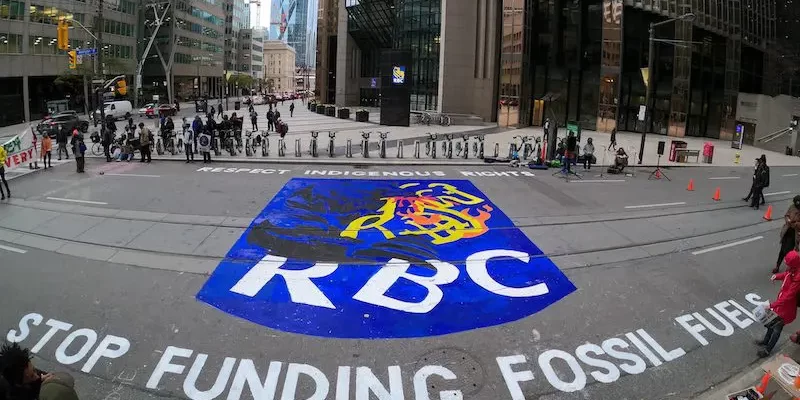
SO-CALLED CANADA / TURTLE ISLAND, LANDS / UNCEDED ANCESTRAL HOMELANDS OF THOUSANDS OF INDIGENOUS TRIBES – Today, the Royal Bank of Canada – Canada’s #1 fossil fuel financing bank – announced its latest climate targets. Unfortunately, RBC’s latest net-zero emissions pledges are essentially just more greenwashing as the bank continues to bankroll high-polluting sectors like fossil fuels. The bank released only ‘intensity-based’ targets for its energy sector clients, essentially which are a license to continue to pollute.
On this latest announcement, Richard Brooks, Stand.earth Climate Finance Program Director, issued the following statement:
“There’s a dictionary-official definition for RBC’s climate targets: it’s called greenwashing. With RBC continuing to bankroll polluters, these pledges are just more smoke and mirrors. While people across Canada bear the brunt of fires, floods, and deadly heat, Canada’s #1 fossil fuel-financing bank continues to pour gas on the flames, bankrolling gas, tar sands, oil, and coal. Instead of financing Indigenous rights-violating fracked gas pipelines, RBC has the opportunity to reinvest in climate-safe solutions and truly live into its climate rhetoric.”
In a recent groundbreaking move, Canada’s Competition Bureau, the country’s federal law enforcement agency for competition law, opened an investigation into RBC’s allegedly misleading climate advertising as the bank continues to finance fossil fuels to the tune of CAD $262 billion since the Paris agreement was adopted in 2016.
RBC competitor Bank of Montreal (BMO) is currently the only major Canadian bank to have set absolute emissions reduction targets for its energy sector clients. Just last week, Deutsche Bank, French bank SocGen, and the UK’s Lloyds all released absolute emissions targets for oil and gas clients. Citibank, the world’s second largest fossil fuel financier, also set an absolute target for its energy sector clients of 29% by 2030. Even these targets, already inadequate, were not met by RBC today.
“By continuing to pump billions into fossil fuels and failing to set science-based targets for reducing financed emissions, RBC is out of step with Canada’s climate plans,” Brooks added. “We can’t advance towards meeting our national goals and global responsibility if the country’s largest bank is dragging us backwards.”
RBC remains one of the largest funders of companies building new fossil fuel projects in the world, including Indigenous rights-violating pipelines such as Coastal GasLink through unceded Wet’suwet’en land, and co-lead arranger and financer of the latest $10 billion loan to build the over-budget, much-delayed TransMountain (TMX) tar sands pipeline.
RBC joined the Glasgow Financial Alliance for Net-Zero (GFANZ) a year ago, in October 2021, promising to align the bank’s lending and investment portfolios with a science-based pathway to net zero by 2050. Membership in the now 500+-strong GFANZ was a condition to access COP26. Now, just ahead of COP27, RBC and Canadian banks risk getting booted from the global network as they push back against global financial standards for climate risk, revealing the bank’s playbook of delay and deceit on climate action.
###




